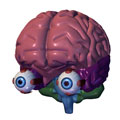 |
To
obtain a reasonably detailed understanding of how the brain develops
before birth, and on into childhood.
|
|
|
 |
To
learn about the experimental methods and techniques used by
developmental cognitive neuroscientists.
|
|
|

|
To
understand some of the mechanisms by which brain development
contributes to -- and is influenced by -- various psychological
developments in infancy and childhood.
|
|
|

|
To
develop
considered opinions about how findings in developmental cognitive
neuroscience bear on theoretical concepts like critical periods in
development, the modularity of mind, and the sources of development
(i.e., nature and nurture).
|
|
|
 |
To
cultivate a
detailed understanding of at least one specific domain of
neurocognitive development (e.g., memory, language, spatial cognition,
attention, or object, face, or number perception).
|
|
|

|
To
become familiar on at least a basic level with concepts related to
connectionist modeling of brain-behavior processes.
|
|
|
 |
To
nurture an
awareness of the value of maintaining a developmental perspective when
endeavoring to understand brains and the cognitions and behaviors
associated with them.
|



